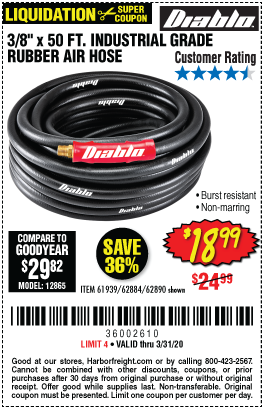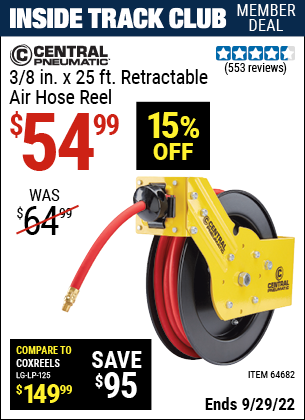If you rely on your Harbor Freight air compressor, you know how important the right hose is for getting the job done smoothly. But with so many options out there, finding the perfect air compressor hose can feel overwhelming.
You want something durable, flexible, and easy to use—something that won’t slow you down or cause frustration. This guide will help you understand exactly what to look for in Harbor Freight air compressor hoses, so you can boost your tool’s performance and finish your projects faster.
Keep reading to discover how the right hose can make all the difference in your work.
Choosing The Right Hose
Choosing the right hose for your Harbor Freight air compressor is important. The hose affects how well your tools work. It also impacts safety and ease of use. Picking the correct hose means better performance and longer tool life. Consider the type, material, length, and diameter carefully. Each factor plays a role in your work quality and comfort.
Types Of Air Compressor Hoses
There are several types of air compressor hoses. Rubber hoses are flexible and durable. They handle rough conditions well. PVC hoses are lighter and less expensive. They work for light to medium tasks. Hybrid hoses combine rubber and PVC. They offer a good balance of strength and weight. Choose the type that fits your job needs.
Material Options
Hoses come in different materials. Rubber is strong and resists kinks and abrasions. PVC is cheaper but less flexible in cold weather. Hybrid hoses mix rubber and PVC for durability and lightness. Some hoses have nylon or polyurethane layers for extra strength. Material choice affects hose life and ease of use.
Length And Diameter Considerations
Pick the right length to reach your work area comfortably. Too short limits movement. Too long can cause pressure drops. Diameter affects air flow. Larger diameters let more air flow through. Smaller diameters may reduce tool power. Match hose size to your air compressor and tools for best results.

Credit: go.harborfreight.com
Durability Factors
Durability is key for Harbor Freight air compressor hoses. These hoses must handle tough jobs without breaking or wearing out fast. Understanding what makes them strong helps you choose the right one. Three main factors affect their durability: resistance to wear and tear, temperature tolerance, and flexibility with kink resistance. Each factor plays a big role in how long the hose lasts and how well it works.
Resistance To Wear And Tear
Hoses face rough surfaces and constant movement. Good resistance to wear and tear means the hose stays strong. It does not crack or get holes easily. Harbor Freight hoses often use tough materials to fight abrasion. This lets the hose last longer in hard jobs.
Temperature Tolerance
Air compressor hoses work in many climates. They must handle cold and hot temperatures well. A hose with high temperature tolerance keeps its shape and strength. Harbor Freight hoses can resist heat from the compressor and cold from outside. This stops damage and keeps air flowing smoothly.
Flexibility And Kink Resistance
Flexible hoses are easier to use in tight spaces. Kink resistance stops the hose from bending sharply. Sharp bends can block air and cause damage. Harbor Freight hoses balance flexibility with strong materials. This makes them easy to move without losing air pressure or breaking.
Maintenance Tips
Proper care of Harbor Freight air compressor hoses helps them last longer and work better. Simple maintenance steps keep the hoses safe and ready for use. Small habits prevent damage and save money over time.
Cleaning And Storage
Clean hoses after each use to remove dirt and dust. Use a damp cloth to wipe the surface gently. Avoid harsh chemicals that can damage the hose material.
Store hoses in a cool, dry place away from sunlight. Coil them loosely to prevent kinks and cracks. Keep hoses off the floor to avoid moisture buildup.
Regular Inspections
Check hoses often for signs of wear, cracks, or leaks. Look at fittings and connections for tightness and damage. Spotting problems early helps avoid sudden failures during work.
Test hoses by running air through them before important jobs. Listen for hissing sounds that indicate leaks. Replace hoses showing any damage or weakness.
Repair Vs Replacement
Small leaks or punctures can sometimes be patched with repair kits. Use only products designed for air compressor hoses. Temporary fixes are best for minor issues and short-term use.
Replace hoses with major cracks, worn areas, or multiple leaks. New hoses ensure safety and reliable air pressure. Investing in replacements prevents accidents and work delays.
Top Harbor Freight Hose Models
Harbor Freight offers a range of air compressor hoses designed to fit various needs. These hoses are known for their durability and ease of use. Whether for home projects or professional work, Harbor Freight has options that suit different tasks. Below are some of the top models available.
Best For Heavy-duty Use
The heavy-duty hoses from Harbor Freight are built to last. They handle high pressure and tough conditions well. These hoses often have reinforced layers for extra strength. They are ideal for construction sites and demanding workshop tasks. Many come with secure fittings to prevent leaks and ensure safety.
Budget-friendly Options
Harbor Freight also offers affordable hoses without sacrificing quality. These budget-friendly models are perfect for casual users and small projects. They provide good flexibility and decent pressure resistance. Despite lower prices, they maintain reliable performance. These hoses are great for those on a tight budget.
Customer Favorites
Some Harbor Freight hoses have become favorites among buyers. These hoses get high ratings for durability and ease of use. Customers praise their lightweight design and strong connectors. Many models offer extra length for better reach. They balance quality and price, making them popular choices.
Common Issues And Solutions
Harbor Freight air compressor hoses are useful tools but can face some common problems. These issues can affect air flow and the overall performance of your equipment. Knowing how to spot and fix these problems helps keep your work smooth and safe. Below are the frequent issues and their simple solutions.
Leaks And Cracks
Leaks and cracks in air compressor hoses reduce air pressure. They often happen due to wear or sharp bends. To find leaks, listen for hissing sounds or use soapy water. Bubbles will form at leak points. Replace hoses with visible cracks or holes. Small leaks can sometimes be patched with special tape, but replacement is best for safety.
Connection Problems
Loose or damaged connections cause air loss and poor tool performance. Check hose fittings and couplers for tightness. Clean dirt or debris from connectors. Use thread seal tape on threaded fittings to stop leaks. Replace worn or broken connectors to keep a secure fit. Proper connections ensure steady air flow and reliable tool use.
Pressure Drop Troubleshooting
Pressure drops can happen from hose damage or blockage. Inspect hoses for kinks or twists that block air flow. Remove any debris inside the hose. Check the air compressor’s pressure gauge to confirm output. Replace old or damaged hoses to restore full pressure. Regular hose maintenance helps avoid pressure problems during work.

Credit: www.harborfreight.com

Credit: go.harborfreight.com
Frequently Asked Questions
What Types Of Hoses Fit Harbor Freight Compressors?
Harbor Freight air compressors typically use standard 1/4-inch or 3/8-inch hoses. Always check your compressor’s specifications for compatibility to ensure optimal performance and safety.
How Do I Maintain Harbor Freight Air Compressor Hoses?
Regularly inspect hoses for cracks, leaks, and wear. Clean them after use and store in a cool, dry place to prolong hose life and maintain efficiency.
Can I Use Universal Hoses With Harbor Freight Compressors?
Yes, universal hoses with compatible fittings and pressure ratings can be used. Confirm hose size and PSI match your Harbor Freight compressor for safe operation.
What Is The Average Lifespan Of These Air Compressor Hoses?
With proper care, Harbor Freight air compressor hoses last 3-5 years. Frequent use or harsh conditions may shorten lifespan, so regular inspection is vital.
Conclusion
Harbor Freight air compressor hoses offer good value and reliable use. They fit many tools and work well for home projects. Choosing the right hose length and material helps avoid problems. Keep hoses clean and check for leaks often. This care extends their life and keeps you safe.
These hoses suit beginners and those with some experience. Trust in their performance for small to medium tasks. Simple, durable, and easy to handle—these hoses meet basic needs. Consider them for your next air compressor setup.

